12 Of The Unhealthiest Sports Drinks On Store Shelves
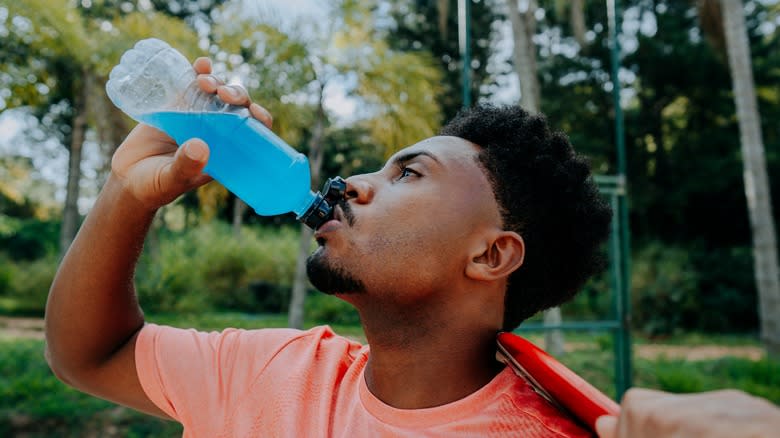
Are you in search of healthy sports drinks? If you're hitting the gym or playing sports, chances are you care about your body. You want to take care of yourself to perform well and feel your absolute best. A key part of this is proper hydration, which involves knowing which sports drinks to buy -- and which to avoid.
But what constitutes healthy and unhealthy, anyway? While water and electrolytes are inherently good for the body, not all sports drinks can claim the same. Some contain harmful additives with zero nutritional value. Others have oodles of caffeine and added sugars. Under the right circumstances, caffeine and sugar can enhance your physical performance. But if you're sitting on the sofa guzzling a 24-ounce Gatorade, those calories will hit differently. And we'd wager not everyone who drinks electrolyte beverages is an athlete. In fact, Future Market Insights reports that the average American consumes two cups of sports drinks daily.
With those odds, it's likely you or your kids are fans of sports drinks. So, if you're looking out for your family's health, keep reading. We've rounded up the 12 unhealthiest sports drinks on store shelves so you can know which to avoid.
Read more: The Absolute Best Energy Drinks, Ranked
Powerade
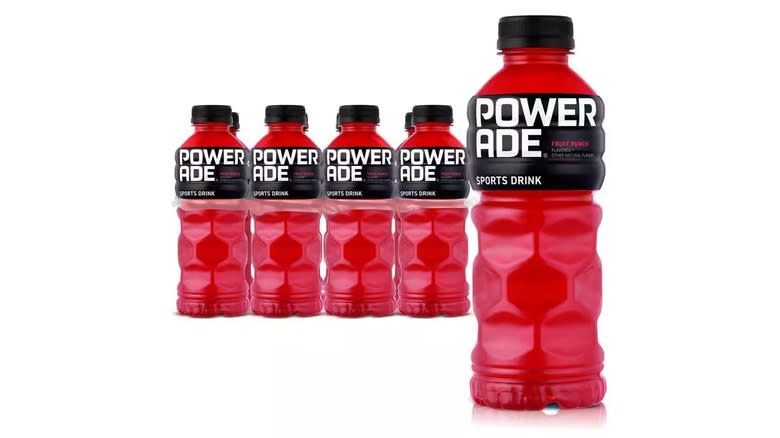
Simple carbs can provide a quick-burning fuel source to power those endurance workouts. Unfortunately, the saying "a calorie is a calorie" isn't exactly accurate, and not all carbs are created equal. Some simple sugars -- especially highly processed ones -- can produce nasty side effects. High fructose corn syrup (HFCS) is one such sugar, and unfortunately, it's one of Powerade's top ingredients. In fact, Powerade's classic beverages have 130 calories per 20-ounce bottle, all of which are from these added sugars.
Although fructose is naturally found in fruits, our bodies aren't equipped for the high quantities in processed foods like Powerade. Per Pfizer, Thomas Magee, Senior Director at Pfizer's Internal Medicine Research Unit, explains that "In evolutionary history, [fructose] was a rare treat, where you might find fructose in a beehive or seasonal fruit, serving as an energy source when food was scarce. Now those with first-world diets have a constant onslaught, and our bodies have not caught up."
High fructose corn syrup takes its toll in several ways. An article in Current Hypertension Reports explains that HFCS can damage your metabolism without increasing your BMI. So, being an athlete with a healthy body weight doesn't mean you're in the clear. This metabolic damage could include hypertension and prediabetes. Ultimately, a healthy metabolism supports athletic function. So, while practicing sports can improve athletic ability in the long term, Powerade may actually hinder it.
Gatorade

Gatorade is undoubtedly the most popular sports drink in the States. According to Future Market Insight, this company dominates roughly 75% of the sports drink market. But just because it's popular doesn't mean it's healthy -- and we question the amount of added sugar in the company's products.
Gatorade markets its original beverage as "The proven classic." It claims it's "the most scientifically researched and game-tested way to replace electrolytes lost in sweat." We don't have issues with the electrolytes in this beverage, but the dyes and added sugar are another story. Gatorade comes in many colorful flavors, but sadly, those colors are far from natural. Take Gatorade's Lemon Lime variety. Anticancer Research found that the dye used, Yellow 5, damages white blood cells and DNA, leading to cell mutations over time. Sadly, dyes aren't the only downside to this popular drink.
Regardless of what flavor you buy, the standard Gatorade has 148 calories per 20-ounce bottle. These calories are made up entirely of sugar. If you're running a marathon, those calories are going to good use. However, if you lead a sedentary lifestyle, Gatorade can cause more harm than good. A Public Health Nutrition study showed that young adults who consumed sports drinks were more likely to drink other sugary-laden beverages and play more video games. If these habits sound familiar, we'd choose a less sugary electrolyte source.
Pedialyte
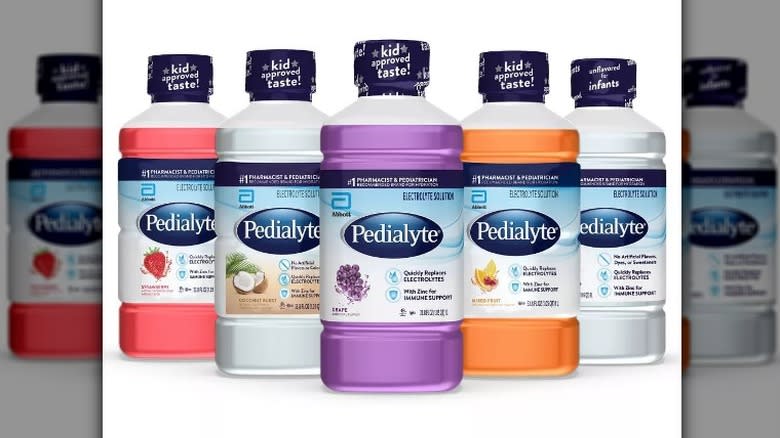
Pedialyte is many people's go-to when rehydrating, particularly after a bout of food poisoning or other illnesses. It has a nice balance of electrolytes, including potassium, zinc, chloride, and sodium -- all minerals that help boost your health. However, not all of Pedialyte's ingredients can say the same.
Pedialyte claims to have a "kid-approved taste." We're guessing the drink's sweetness has something to do with this. The beverage achieves its sugary flavor with dextrose, sucralose, and acesulfame potassium. Pedialyte Sport and Pedialyte Sport Powder Packs also contain these ingredients. Three sweeteners seem like overkill to us. While the last two are calorie-free, they come with some serious caveats.
In a Nutrients study, acesulfame-K was shown to increase the fat content of the liver. And in another study published in PLuS ONE, acesulfame-K caused gut disturbances and weight gain. Although most of these studies were done on mice, it's safe to say these artificial sweeteners aren't entirely healthy for any species. So, if you're considering handing one to your kid, we'd think again.
Body Armor
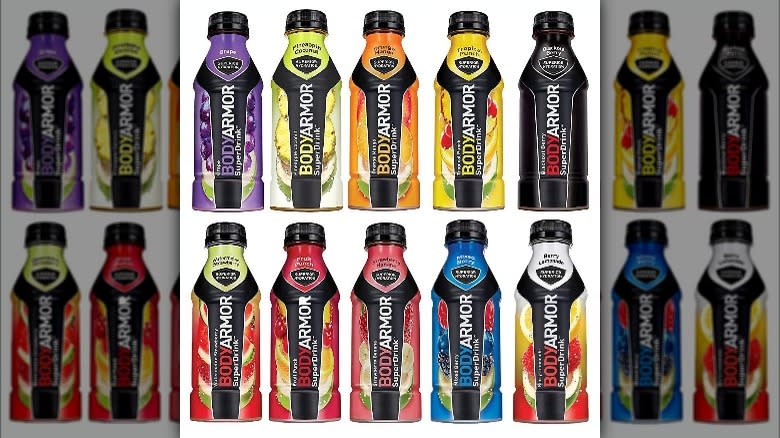
Body Armor is a step up from the other sports drinks on this list. It contains coconut water, which is naturally packed with electrolytes, and the brand avoids artificial ingredients. It also has vitamins A, C, E, and several B vitamins. But don't be fooled, although it has some pros, it still contains a decent amount of cane sugar, a less processed -- albeit still processed -- sweetener.
A 12-ounce serving of Body Armor has 90 calories and 21 grams of sugar. 12 ounces is the size of a can of soda. When you're working out, you're probably drinking twice that much, putting you at 180 calories and 41 grams of sugar. While cane sugar is marketed as a healthier option -- at its core, it's pretty much the same as table sugar.
According to Medical News Today, excessive sugar consumption can lead to weight gain, even if you're physically active. A 2014 study from the Journal of Nutrition showed that sugary beverages affected the hormone leptin. This is our satiety hormone. It lets us know when we're satisfied so we can stop eating. When this hormone is impaired, we crave more food than we need. So, consuming sugary beverages like Body Armor might damage our ability to manage these healthy body signals.
Kirkland Signature Sport Drink
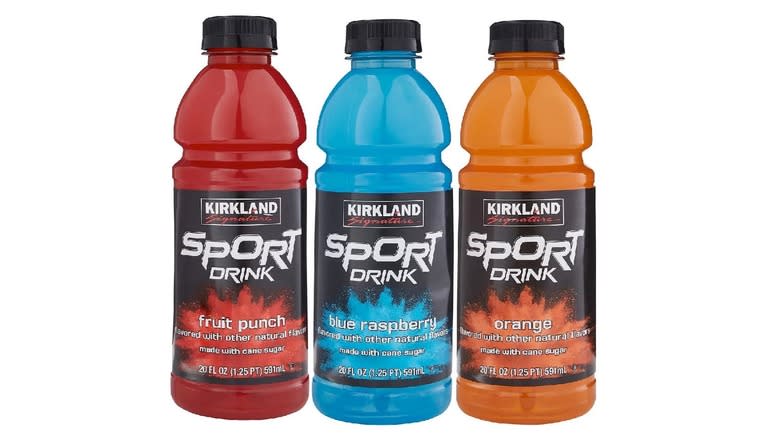
Kirkland, Costco's signature brand, makes everything from candy and clothing to -- you guessed it -- sports drinks. Kirkland Signature Sport Drinks have 150 calories and 35 grams of added sugar per 20-ounce bottle. These beverages come in various flavors like fruit punch, orange, and blue raspberry, which are all easily identifiable by their bright colors. Unfortunately, these pretty hues come at a price. They contain ingredients like Blue 1, Yellow 5, and Red 40, among other chemicals.
An International Journal of Occupational and Environmental Health review found that these dyes contained carcinogens and caused hypersensitivity reactions. Hypersensitivity reactions are immune responses ranging from intense and immediate to much more subtle. You might not go into anaphylactic shock, but that doesn't mean these artificial dyes aren't harming you. Many people have a delayed reaction. Their bodies sense that these dyes are foreign invaders and create an immune response to attack them. This creates inflammation throughout the body, eventually leading to tissue damage.
To top it off, these dyes don't contribute any nutritional value to the beverage. They are simply for aesthetic purposes because, let's be honest, pretty foods sell. Kirkland isn't the only company to use this marketing tactic. Many electrolyte beverage companies are guilty of it -- so we'd be weary of any brightly colored sports d rinks on shelves.
Gatorade Zero
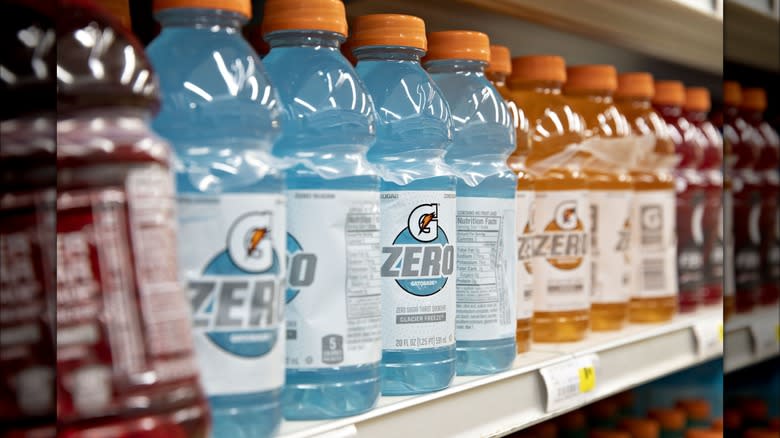
Are you trying to avoid excess sugar or calories? You might think Gatorade Zero is the healthy answer -- but we'd think again. A 20-ounce serving of Gatorade Zero has 10 calories made up of 3 grams of carbohydrates. Stevia is to thank for the low-calorie content. But when you look closely at that ingredient label, you'll also notice artificial coloring and modified food starch.
It's safe to be doubtful of anything artificial or with "modified" in its name. Eating healthy usually means eating foods close to nature, and synthetic or modified ingredients are the opposite of this. Modified doesn't necessarily mean genetically modified. Regardless, modified food starch is creeping into more and more food products. Although some people might tolerate it in small quantities, others report adverse reactions. On one Reddit thread, a user commented, "I get stomach / upper GI pains about 4-5 hours after eating the food, even if the modified starch is only a very minor ingredient." They're not alone, as others chimed in with similar issues.
Of course, these are self-reported food sensitivities. You'd need much more research to determine a cause-and-effect relationship. However, common sense goes a long way when avoiding unhealthy products. If a drink's ingredient list sounds unnatural, we'd avoid it altogether.
Propel
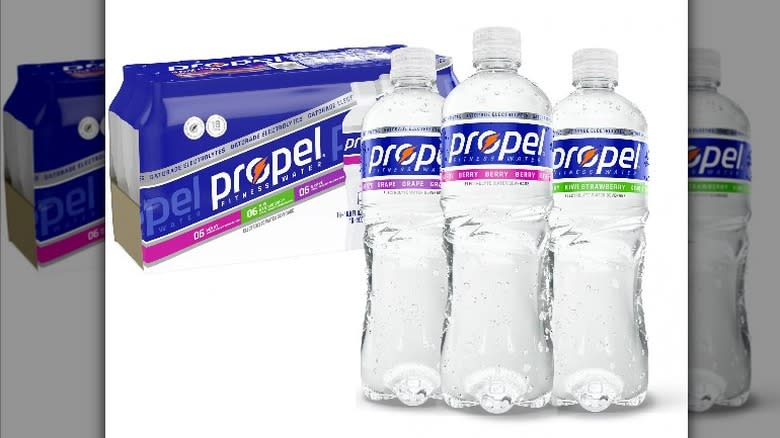
Propel is another sports drink under the Gatorade umbrella. However, this beverage differs from the rest because it's marketed as "fitness water." You won't get any colorful bottles here. Instead, Propel's clear liquid reflects the true nature of water. But although the drink may appear transparent, its nutritional profile isn't.
Propel has several products, including Electrolyte Hydration and Immune Support waters. You'll find them in flavors like berry, kiwi strawberry, lemon, and peach, to name a few. These beverages are advertised as being sugar and calorie-free, yet they still have an undeniable sweetness. So, how does Propel achieve this? In part, with sucralose. Sucralose is an artificial sweetener known to have several adverse side effects.
A Nature study in mice showed that sucralose lowers the body's ability to fight off cancer and infections. Basically, sucralose hindered immune cells from doing their job. Another article published in Frontiers in Nutrition found that sucralose could change the gut microbiome. Ultimately, everything you consume affects your microbiome for good or bad. However, these researchers noticed a correlation between undesirable gut bacteria and long-term sucralose consumption. Since health begins in the gut, we'd be cautious of what you eat -- or drink -- that could impact that.
Vitaminwater
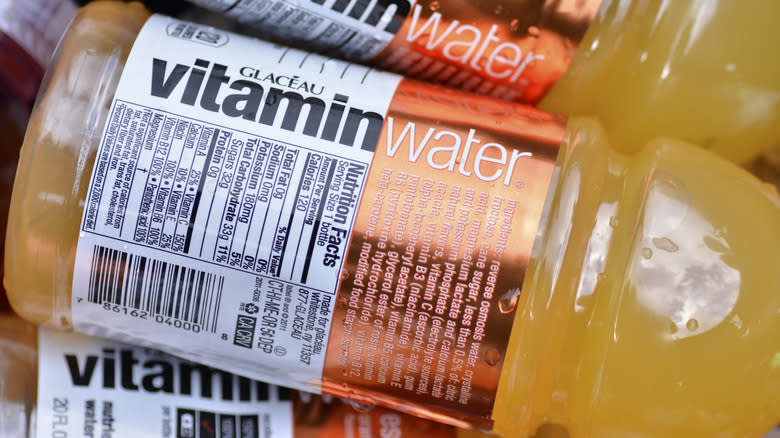
Is Vitaminwater a nutritious beverage or merely a marketing scheme? As its name suggests, the drink does have significant amounts of vitamins and minerals, including vitamin C and several B vitamins. Plus, with Vitaminwater flavors like Essential, Energy, and Focus, it's easy to believe the health hype. However, according to a 2011 Guardian article, the Coca-Cola company was banned from advertising its Vitaminwater products as "nutritious" -- and for good reason.
One 20-ounce bottle of Vitaminwater has 100 calories and 27 grams of sugar. Coca-Cola's 20-ounce Coke has 240 calories and 65 grams of sugar. Side by side, Vitaminwater's sugar content seems low. However, nobody is claiming Coke as a healthy beverage. While Vitaminwater has significantly less sugar, its 6.5 teaspoons is still not considered nutritious.
We respect Vitaminwater's clever branding, but we wouldn't buy it on the way to the gym. Most VitaminWater's flavors have zero sodium, a key mineral lost through sweat. As such, it doesn't meet the rehydrating criteria of your standard sports drink. And considering all the added sugar, you're better off getting your daily dose of vitamins elsewhere too.
Gatorade Fast Twitch

To power your performance, Gatorade Fast Twitch swaps sugar for caffeine. This might be a welcomed addition for those who enjoy a caffeine-boost pre-workout. One 12-ounce bottle has 200 mg of the stuff. To put this in perspective, an 8-ounce cup of coffee has roughly half this amount. But while caffeine is healthy in the right quantities, individual tolerance varies wildly. And if you're caffeine-sensitive, proceed with caution.
The Food & Drug Administration reports that 400 mg of caffeine daily is safe for most healthy adults. But if you've already had a few cups of coffee or an energy drink, you may want to reconsider that caffeinated sports drink. It can put you over the edge, leading to anxiety and a disrupted body clock, especially when consumed later in the day, per Healthline. Also, we wouldn't let children drink Fast Twitch at all. While the FDA has not set a caffeine level for kids, it discourages those under 18 from consuming caffeine entirely.
We appreciate that Fast Twitch uses vegetable coloring rather than synthetic dyes. However, the brand still opts for sucralose over healthier alternatives. While Fast Twitch might be a step up from some of Gatorade's products, we wouldn't call it healthy.
Powerade Zero

Powerade Zero has several flavors, including Fruit Punch, Mixed Berry, Orange, and Grape. Powerade Zero boasts vitamins C and B12, plus significantly more electrolytes than other leading sports brands. Regardless of the size of the bottle you reach for, you can expect it to be a zero-calorie drink. However, excess sugar and calories aren't the only things to look out for in sports drinks. Despite Powerade Zero's sugar-free status, it has other potentially dangerous ingredients.
Powerade is sweetened with sucralose and colored with artificial dyes. Both the Fruit Punch and the Grape flavors contain Red Dye 40, which has been linked to allergies, migraines, and ADHD, per Healthline. The Orange variety is made with Yellow 5. A Journal of Pediatrics study found that this chemical, known as tartrazine, caused mood disturbances ranging from irritability to depression. Basically, if you see a color followed by a number on the ingredient label, steer clear of the product.
Drip Drop

Drip Drop is a convenient electrolyte drink mix. These travel-friendly packets claim to have three times the electrolytes and half the sugar of leading sports drinks. One stick has 35 calories and significant amounts of sodium, potassium, magnesium, and zinc. Unfortunately, the flavor is enhanced by not one -- but four – sweeteners, including sugar, fructose, dextrose, and sucralose.
That's a quadruple whammy of sweeteners, and one that is particularly notable is fructose. Studies show that fructose is more damaging than other forms of sugar, per Healthline. This is partially because fructose is metabolized by the liver. Fructose is increasingly prevalent in processed foods. Chronic fructose consumption adds extra strain on this vital organ. This can lead to fatty liver disease and type 2 diabetes (via Diabetes, Metabolic Syndrome and Obesity: Targets and Therapy).
One Drip Drop packet won't kill you. If you're in dire need of electrolytes once in a while, it's worth the tradeoff. However, daily decisions add up. When fructose sneaks into your diet here and there, it can amount to notable -- and damaging -- quantities.
Liquid I.V.
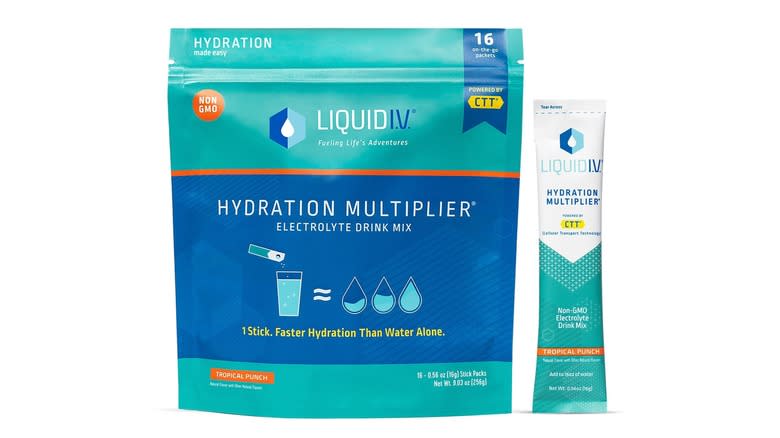
Liquid I.V. is a catchy name, and it's gaining popularity as a way to rehydrate after exercise, illness, or a long night. Liquid I.V. does many things right compared to other sports drinks. It has significant amounts of sodium, potassium, vitamin C, and B vitamins. Plus, one stick of the Lemon Lime Hydration Multiplier has just 45 calories. However, those calories are made up entirely of added sugar. While Liquid I.V.'s 11 grams of sugar is significantly lower than your standard Gatorade or Powerade, we can't completely excuse it.
Liquid I.V. uses Stevia, dextrose, and pure cane sugar to pack loads of sweetness into one serving. We might enjoy this sweet flavor in the moment. Unfortunately, a constant onslaught of sweet foods can cause serious damage in the long run. Sugar activates the reward systems in our brains, releasing feel-good hormones like dopamine, per Neuroscience and Biobehavioral Reviews. These sensations don't last forever, and once our hormones begin to fall, we crave more of whatever gave us that high. So if you feel a sugar addiction brewing, try making a homemade sports drink instead -- and make sure to go easy on the sweeteners.
Read the original article on Daily Meal.

